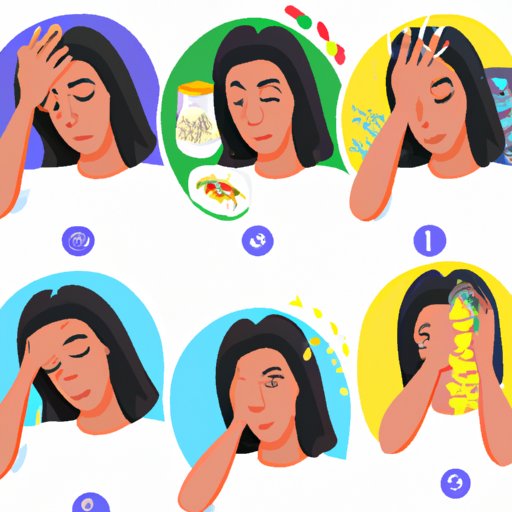
Introduction
Headaches are a common ailment that can range from a minor annoyance to a debilitating condition. While there are many causes of headaches, knowing how to get rid of them is important in order to maintain a healthy and productive lifestyle. In this article, we will explore natural remedies, over-the-counter medication options, the benefits of hydration, diet and lifestyle changes, and when it’s necessary to seek medical attention.
Natural Remedies to Get Rid of a Headache
Natural remedies can be a great option when it comes to treating headaches. Not only are they often more cost-effective than medication options, but they can also have fewer negative side effects. Here are some natural remedies you can try:
Drinking Plenty of Water
Dehydration can be a major trigger of headaches, so it’s important to make sure you’re drinking enough water throughout the day. A good rule of thumb is to aim for eight 8-ounce glasses of water per day.
Taking a Warm Bath
A warm bath can help to ease tension and promote relaxation, which can help to relieve headache symptoms. Adding epsom salt or other bath products can also enhance the soothing effects of a warm bath.
Using Peppermint or Lavender Essential Oils
Peppermint and lavender essential oils have been shown to have pain-relieving properties and can help to ease headache symptoms. You can use these oils by inhaling them directly, adding them to a diffuser, or diluting them with a carrier oil and applying them topically.
Practicing Meditation or Yoga
Meditation and yoga can help to reduce stress and tension, which can be major triggers of headaches. By incorporating these practices into your daily routine, you may be able to reduce the frequency and intensity of your headaches.
Over-the-Counter Medication Options
In some cases, natural remedies may not be enough to relieve headache symptoms. That’s where over-the-counter medication options come in. Here are some of the most common over-the-counter pain relief options:
Ibuprofen
Ibuprofen is an anti-inflammatory pain reliever that can be effective in relieving headache symptoms. However, it should not be taken on an empty stomach and can cause stomach irritation with prolonged use.
Aspirin
Aspirin is another anti-inflammatory pain reliever that can be effective in treating headaches. However, it should not be taken by individuals who are allergic to aspirin or have a history of stomach ulcers or bleeding disorders.
Acetaminophen
Acetaminophen is another pain reliever that can be effective in treating headaches. It is generally considered safe for most people, but should not be taken in excess as it can cause liver damage.
The Benefits of Staying Hydrated
Staying hydrated is important not only for overall health but also for preventing headaches. Dehydration can cause headaches, so it’s important to make sure you’re drinking enough water throughout the day. Other benefits of staying hydrated include:
- Regulating body temperature
- Detoxifying the body
- Keeping skin healthy and glowing
If dehydration is already a trigger for your headaches, it’s important to make sure you know how to rehydrate effectively. One option is to drink a sports drink that can help to replenish electrolytes lost through dehydration. You can also eat water-rich foods like watermelon and cucumbers.
Diet and Lifestyle Changes
Diet and lifestyle changes can be effective in reducing the frequency and intensity of headaches. Here are some healthy diet and lifestyle changes you can make:
Eating a Balanced Diet
Consuming a balanced diet that is high in whole foods and low in processed foods can help to reduce the frequency and intensity of headaches. It’s also important to make sure you’re eating regularly throughout the day to keep your blood sugar levels stable.
Avoiding Triggers Like Caffeine or Alcohol
Caffeine and alcohol can be major triggers of headaches, so it’s important to limit your intake of these substances or avoid them altogether if they are already a trigger for you.
Getting Regular Exercise
Regular exercise can help to reduce stress and tension, which can be major triggers of headaches. It’s important to aim for at least 30 minutes of moderate exercise per day, such as brisk walking or cycling.
When to Seek Medical Attention
While most headaches are nothing to be concerned about, some headaches can be a sign of a more serious underlying condition. Here are some signs that you should seek medical attention:
- Headaches that are getting progressively worse
- Headaches that are accompanied by other symptoms, such as fever or nausea
- Headaches that are disrupting your normal daily activities
- Headaches that are new or unfamiliar to you
If you are experiencing any of these symptoms, it’s important to speak with a healthcare professional to determine the cause of your headaches and the most appropriate treatment options.
Conclusion
Headaches can be a major source of discomfort and can disrupt your daily routine. However, by incorporating natural remedies, over-the-counter medication options, staying hydrated, making healthy diet and lifestyle changes, and knowing when to seek medical attention, you can manage your headaches and maintain a healthy and productive lifestyle.
For more information on headache prevention and treatment, consult with your healthcare provider or visit reputable online resources like the Mayo Clinic or National Headache Foundation.




